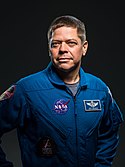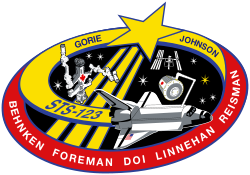Robert Behnken
| Robert L. Behnken | |
|---|---|
 Robert Louis Behnken | |
| Astronaut NASA | |
| Státní příslušnost | |
| Datum narození | 28. července 1970 (53 let) |
| Místo narození | Creve Coeur, Missouri, USA |
| Předchozí zaměstnání | letec |
| Hodnost | plukovník USAF |
| Čas ve vesmíru | 93 dní, 11 hodin a 42 minut |
| Kosmonaut od | srpna 2000 |
| Mise | STS-123, STS-130, SpX DM-2 |
| Znaky misí | |
| Kosmonaut do | 11. listopadu 2022 |
| Některá data mohou pocházet z datové položky. | |
Robert Louis Behnken (* 28. července 1970 Creve Coeur, Missouri, USA) je americký strojní inženýr, letec a astronaut, 469. člověk ve vesmíru. Absolvoval tři kosmické lety k Mezinárodní vesmírné stanici (ISS) a na oběžné dráze Země strávil celkem 93 a půl dne.
Život
Studium a zaměstnání
Absolvoval střední školu Pattonville High School v Maryland Heights (1988), vysokoškolské vzdělání získal na Washington University v St. Louis (bakalář 1992). V roce 1997 získal doktorát na California Institute of Technology a zde také zpočátku pracoval jako strojní inženýr. Později v armádě testoval různé druhy letadel, nalétal 1000 letových hodin.
V letech 2000 až 2002 absolvoval výcvik budoucích kosmonautů v Houstonu, poté byl zařazen do tamní jednotky astronautů NASA.
Má přezdívku Bob. Je ženatý s astronautkou Katherine McArthur a spolu mají syna Theodora. Jeho zálibou je jízda na horském kole, lyžování, turistika.
Lety do vesmíru
Na oběžnou dráhu se dostal dvakrát ve funkci letového specialisty raketoplánu Space Shuttle a jednou jako pilot lodi Crew Dragon. Při všech třech letech pracoval na orbitální stanici ISS, strávil ve vesmíru 93 dní, 11 hodin a 42 minut. Absolvoval také deset výstupů do volného vesmíru (EVA), strávil tam celkem 61 hodin a 10 minut.
- STS-123 Endeavour (11. března 2008 – 27. března 2008)
- STS-130 Endeavour (8. února 2010 – 21. února 2010)
- Crew Dragon Demo 2 (30. května 2020 – 2. srpna 2020)
Od července 2012 do července 2015 vykonával funkci vedoucího Kanceláře astronautů NASA, přičemž odpovídal za záležitosti astronautů včetně řízení výcviku a plánování misí.[1]
Z oddílu astronautů i z NASA odešel 11. listopadu 2022.[1]
Odkazy
Reference
- ↑ a b BARDAN, Roxana. Pioneering Astronaut Bob Behnken Retires from NASA. NASA [online]. 2022-11-10 [cit. 2023-07-25]. Dostupné online.
Externí odkazy
 Obrázky, zvuky či videa k tématu Robert Louis Behnken na Wikimedia Commons
Obrázky, zvuky či videa k tématu Robert Louis Behnken na Wikimedia Commons - Na webu Space
- Na webu MEK-Kosmo
- Web Hvězdárna Vsetín
Média použitá na této stránce
NASA Astronaut Bob Behnken has been assigned to the first flight of SpaceX’s Crew Dragon.
The official patch for STS-130. The shape of the patch represents the Cupola, which is the windowed robotics viewing station, from which astronauts will have the opportunity not only to monitor a variety of ISS operations, but also to study our home planet. The image of Earth depicted in the patch is the first photograph of the Earth taken from the moon by Lunar Orbiter I on August 23, 1966. As both a past and a future destination for explorers from the planet Earth, the moon is thus represented symbolically in the STS-130 patch. The Space Shuttle Endeavour is pictured approaching the ISS, symbolizing the Space Shuttle's role as the prime construction vehicle for the ISS.
STS-123 continues assembly of the International Space Station (ISS). The primary mission objectives include rotating an expedition crew member and installing both the first component of the Japanese Experimental Module (the Experimental Logistics Module - Pressurized Section (ELM-PS)) and the Canadian Special Purpose Dexterous Manipulator (SPDM). In addition, STS-123 will deliver various spare ISS components and leave behind the sensor boom used for inspecting the shuttle's thermal protection system. A follow-on mission to ISS will utilize and then return home with this sensor boom. A total of five spacewalks are planned to accomplish these tasks. The mission will also require the use of both the shuttle and ISS robotic arms. STS-123 will utilize the Station-Shuttle Power Transfer System to extend the docked portion of the mission to eleven days, with a total planned duration of 15 days. The crew patch depicts the space shuttle in orbit with the crew names trailing behind. STS-123's major additions to ISS (the ELM-PS installation with the shuttle robotic arm and the fully constructed SPDM) are both illustrated. The ISS is shown in the configuration that the STS-123 crew will encounter when they arrive.




